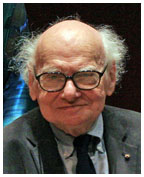
|
July 19, 2006: A moment with...
 |
Milton
Babbitt *92
Milton Babbitt *92, a world-renowned composer and Princeton emeritus professor, has been called one of the most "vital, productive, combative, and controversial" composers of the 20th century. A Jackson, Miss., native, Babbitt recently turned 90 and was honored at several celebrations this spring (see Notebook, page 16). Winner of the Pulitzer Prize and the MacArthur "genius" fellowship, Babbitt retired from the University in 1984 but still commutes from his Princeton home to New York, where he teaches at Juilliard. He looked back with PAW's Mark F. Bernstein '83. [To read about Babbtit in the Notebook section of this issue, click here.]
What was the music program at Princeton like when you arrived to teach and study in 1937?
At first music wasn't even its own department — it was part of the Department of Art and Archaeology. The people in art and archaeology resented us and weren't interested in music at all. We started off with a little office under the eaves in McCormick Hall and after World War II we moved into Clio Hall. We did all our teaching in the chapel crypt and in Murray-Dodge Hall, where we were accompanied by the bats.
Is it true that Princeton rejected your Ph.D. thesis?
At first I got a master's in fine arts because Princeton didn't give Ph.D.s in music in those days. But then a group of us decided to try to be the first to earn a Ph.D. My doctoral thesis was called "The Function of Set Structure in the 12-Tone System," and it contained a lot of things I had already taught. I submitted it and the music faculty rejected it on the basis that they could not understand it. Fifty years later, the dean of the graduate school took me to lunch and said my thesis finally had been accepted by the music department, and I was awarded a Ph.D. But this was after Princeton had already given me an honorary degree.
How has the town of Princeton changed in the almost 70 years you have lived here?
This used to be a lovely university town. Now it's a tourist town. And the worst part of it is, there are no more reasonable eating places. In the old days, there was a place on Nassau Street we called The Balt. They had wonderful doughnuts. We also used to go to the Annex for beer and a sandwich but now that's closed, too.
You seem remarkably hale for 90. What is your secret?
Who knows? I'm not a very heavy eater. I used to smoke, but I stopped in 1962 when I went out to Santa Fe to help celebrate Igor Stravinsky's 80th birthday. As I got off the bus, Stravinsky said, "I have to talk to you. My doctor has just told me I have to stop smoking and I can't do it." So I said, "I'll tell you what, Mr. Stravinsky. I just read the British surgeon general's report on smoking. Let's stop together."
Stephen Sondheim was a student of yours. Is it true that you made a small contribution to West Side Story?
The show was called East Side Story originally, you know. Of course, I knew Lennie Bernstein, who wrote the score, but he was not a favorite of mine, nor I of his. Steve knew this and came down one day and played a song from the show called "Tonight." He said, "It's not very good, but I'll have to write a lyric." So he played it through and I said, "Look here, at the end the least he can do is wrinkle the beginning," and I showed him something he could do harmonically. So later, Stephen played it for Bernstein and he said, "Oh, you must have gotten that from Milton."
In Mozart's time, musical compositions were commissioned by wealthy patrons. Who are the patrons of modern composers?
That's the nasty question. The government became a patron with the National Endowment for the Arts, but the NEA today is virtually dead. The Ford Foundation commissioned work for a while. The music division of the Library of Congress made many commissions, not only for Americans but for Europeans, but their funds have been cut so. Now the great sources are gone. The situation for young composers has never been this bad.
You wrote a controversial article for High Fidelity magazine in 1958 titled "Who Cares If They Listen?" Does it matter to a composer that there be an audience for his work?
That article came from an off-the-cuff lecture Aaron Copland asked me
to give at Tanglewood. My title was, "The Composer as Specialist,"
and someone at the magazine stuck their own title on it instead. Now obviously,
I care very deeply if you listen. From a purely practical point of view,
if nobody listens and nobody cares, you're not going to be writing music
for very long. But I care how you listen. If someone comes up and says
that a piece I wrote is too loud or too dissonant, I'll try to discuss
what he means. You tell me what you hear, and then we'll have something
to discuss. But most of the people who make those sorts of complaints
don't know music. ![]()
From Milton Babbitt: Philomel, copyright 1995. Used by permission of New World Records.
Phonemena for soprano & tape - Click
here to listen (MP3 format, 90 second excerpt)
Composed by Milton Babbitt
with Lynne Webber
Post-Partitions, for piano -
Click here to listen (MP3 format, 90 second excerpt)
Composed by Milton Babbitt
with Robert Miller
Reflections, for piano & synthesized tape
- Click here to listen (MP3 format,
90 second excerpt)
Composed by Milton Babbitt
with Robert Miller
